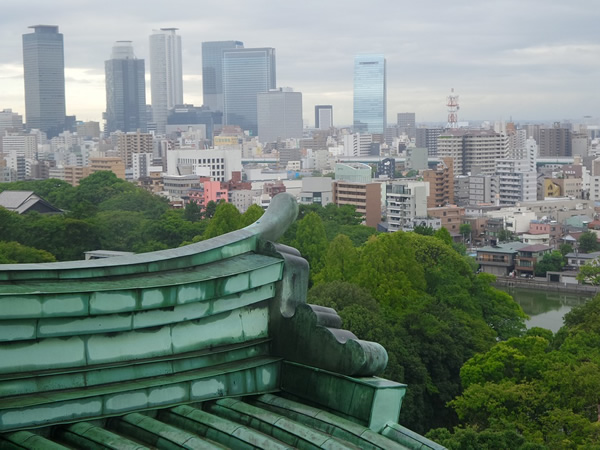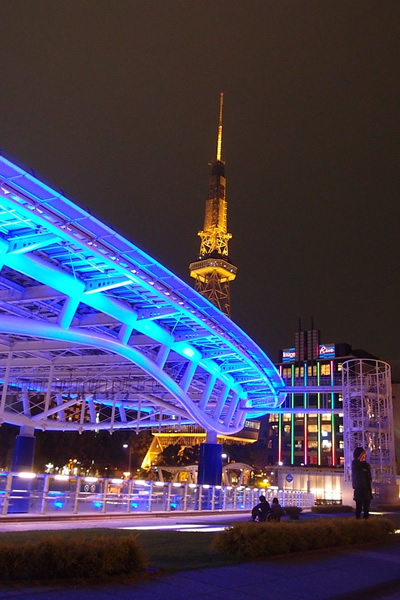Living and Teaching English in Japan as an Expatriate
By Camille Bromley

|
|
Skyline of Nagoya, Japan as seen from a castle.
|
My first weekend in Nagoya, Japan, was a blur of neon lights, hard glass towers, and wide boulevards. People walked faster. Their polished shoes clicked on the pavement. Pedestrians did not wait for the green to cross the street. They streamed by while I waited patiently as I was used to doing.
I had come to find an apartment to be ready and waiting for my arrival one month later, at the end of July. The rental agent was not deterred by my hesitant Japanese. He zipped me around in his Toyota Prius, throwing open the doors to apartments and inquiring every few minutes, “Suki desu? How do you like it?” Before signing the contract, he offered me a “joke” cracker — wasabi flavored, so strong you could smell it across the room. I might have noticed if I hadn’t been distracted by the relief of finding a place to live and his staccato bowing. As it happened, I accidentally swallowed a huge mouthful. I ceased to breathe for several seconds, choking up the half-chewed cracker into my napkin as politely as possible, tears running involuntarily down my cheeks. The travel agent had a good laugh, and we sealed the deal.
Saying a Long Goodbye to Quiet Oita, Japan
Leaving the bustling Honshu island, known for Japanese business and city life, I returned to Oita, a serene town on Japan's southern island. There, had I spent a year in the Japan Exchange and Teaching Program.
During my final month, I bid farewell to dear and familiar faces: fellow JETs, Japanese co-workers, schools, and the local tempura restaurant. I packed my bags, carrying drawings of me from 6-year-old students, portable chopsticks, and email addresses on paper scraps for future contact. Some things remained behind, including Crocs, a gift from Sakura-sensei at Wasada Jr. High School, and a shelf of Japanese language books.
While moving to a foreign country for the first time can be challenging, relocating within the same country can be even more intimidating. It took a full year in Oita to adapt to expatriate life, with the invaluable support of the JET program.
Eventually, I settled into the comfort of work, my apartment was well-arranged, and friendships had formed. Navigating the city became second nature, and I had devised ways to manage my limited Japanese skills. I had even discovered a reliable hairdresser, the town's finest ramen spot, and the perfect running route. A year of trial and error had passed, only to be reset as I embarked on a fresh start.
Nevertheless, city life tempted me — I yearned to know more of Japan. This is what Japan was, after all, in our foreign imaginations; the land of skyscrapers and crowds, lights and high-speed trains and robot technology. Was there some truth to the images, outside of sleepy rural towns? Oita had become too quiet, too comfortable, what else was there left to discover? I was not ready to return home — very few JETs are, after only one year — and I had just settled in Japan. I decided to move to Nagoya, the 4th largest city in Japan. Those of my JET colleagues who did not return home stayed in Oita.
Would I miss the intimacy of small town life, the friendliness of small town people? As the plane left the blue coast of Kyushu Island behind, I thought of Yoshino Jr. High School, where the math teacher had presented me with an icebox of fresh squid he had fished himself from the river, because I had mentioned that I liked squid sashimi. I thought of Kimi-san, the prim old woman with perfectly coiffed hair who invited me to her home and showed me how to wear a yukata, the summer kimono. I thought of Shinya with the spiky hair and corny jokes, who offered me free Japanese lessons over a teriyaki burger and fries every Thursday at Mosburger. Would I find myself lost in Nagoya? Would I be able to find a job, find friends? Would my Japanese degrade with less easy exposure to Japanese locals? Don’t people always say that the most authentic cultural experiences are found in small towns?
Transition to City Life in Nagoya, Japan
I arrived in full blast of the Nagoya summer. My apartment still lacked an air conditioner, and Best Denki, the appliance store, had none available for several weeks. I began my job search, navigating through pockets of humidity in a black suit. Sleeping at night was impossible. The neon sign from the love hotel next door blinked through my window, reflecting pulses of red light onto the ceiling. I continued my search.

|
|
Nagoya at night.
|
After a few weeks, the heat lifted, allowing the city to take a deep breath. The air conditioner arrived, and life went on. My apprehensions about finding a job and getting settled were quickly forgotten. Jobs for teaching business English in Nagoya, the automotive capital of Japan, seemed to fall from the sky. I promptly filled in gaps in my schedule with private lessons and English conversation schools. Within a month, I was managing a full-time freelance schedule.
I found a message board at the Nagoya International Center and posted requests for Japanese and French language partners. My cell phone inbox was flooded with messages for weeks after. I found dozens of Japanese community classes and started lunching with other foreigners taking the courses. Our conversations every week were a hilarious assortment of languages and accents. Japanese, English, French, Italian, and Spanish flew everywhere, sentences entangling, jokes communicated through gestures. My Japanese blossomed. I found yet more work through contacts.
More importantly, my vision of Japan grew broader and more detailed. Women on the Nagoya streets wore their hair as high as their heels. I met many Japanese people who spoke fluent English and other languages. Every weekend, there were art exhibits and independent films. In contrast to conservative Oita, I saw that Japan could be cosmopolitan, cultured, and creative. I saw variety. In Oita, I had been the only variety in a population of Oita-born-and-breds. In Nagoya, my foreign presence was not exceptional. People were not impressed by a few words of clumsy Japanese. They were not astounded that I could manipulate a pair of chopsticks. They brushed past me on the street without a second look. I learned that the impression I had formed of Japanese people the previous year did not describe Japanese people at all, but only Japanese people who lived in Oita. I stopped forming sentences along the lines of, “Japanese people do this . . . Japanese people are like this . . .”. I stopped feeling like a foreign resident of Japan and more like a resident of Japan.
Expat Life in Nagoya
As an expatriate living abroad (and especially in a country like Japan, which is so radically different from Western countries), it is easy to notice the differences between your home culture and theirs, to be too quick to generalize, to define all the variety of Japan by a small town in the south. Living in Nagoya — in a completely different context than I had experienced before — taught me that an authentic cultural experience does not depend on the size of the community but rather on how you integrate into the community and how much you are changed by the environment and learn from the people. For me, integration was much easier in Nagoya simply because it was a larger city with a greater variety of people to meet, more job opportunities, more language classes, and much more to see and get involved in.
For expats who can move to another location and try something new in the same country, seize it! Now I have truly lived in Japan, I have seen two sides of this country, and I have a better idea of how many more there are to discover.
After one year in Nagoya, I left for new horizons. I found myself saying sayonara again, but the goodbyes were more profuse and profound this time. I was sad to leave the workplaces where I had found myself and the friends I had made out of effort and common interest, not out of circumstance. My life in Nagoya was one that I had built myself, and I had become more attached to it. Looking back on my time in Japan, both experiences complement each other, but it was my year in Nagoya that defined what Japan meant to me and how my life was affected by it.
Camille Bromley spent two years in Japan as a participant on the Japan Exchange and Teaching (JET) Program and as a freelance English teacher.
|
